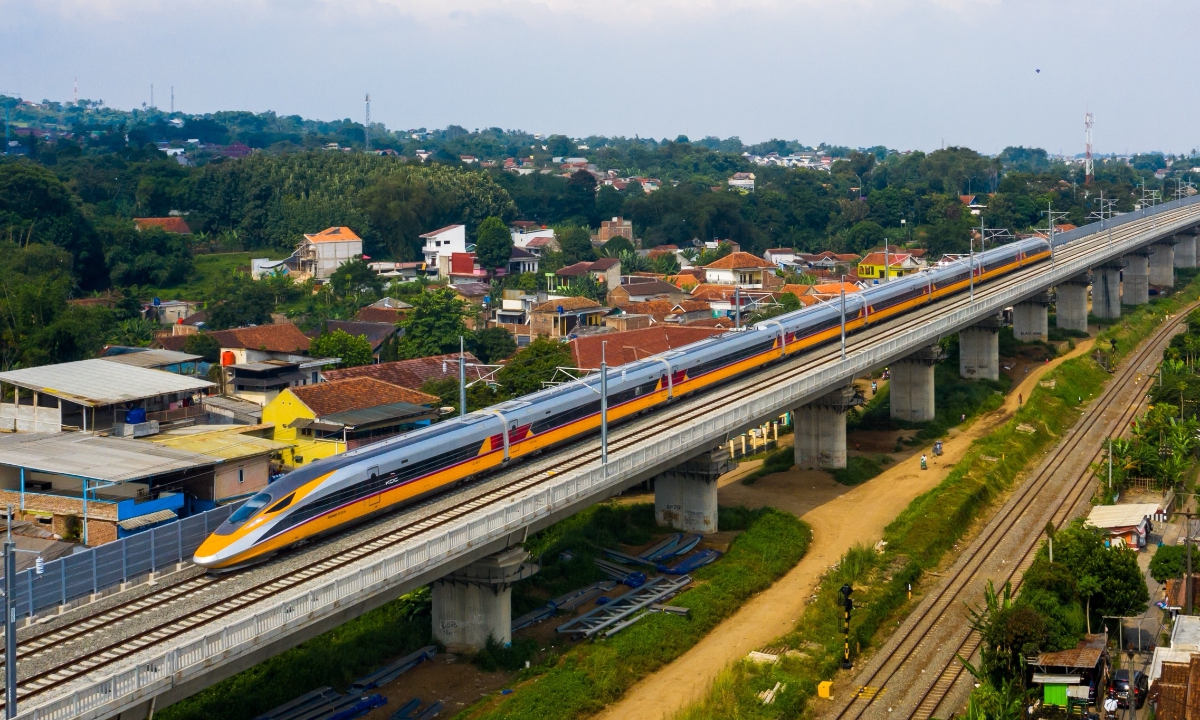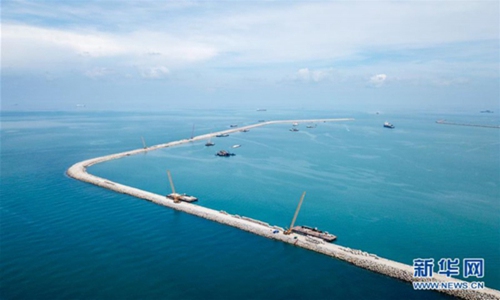Western bad faith revealed viewing BRI through a zero-sum perspective: Italian scholar

Illustration: Tang Tengfei/Global Times
Editor's Note:
This year marks the 10th anniversary of the Belt and Road Initiative (BRI) proposed by Chinese President Xi Jinping. Through the lens of foreign pundits, we take a look at 10 years of the BRI - how it achieves win-win cooperation between China and countries along the Belt and Road and how it increases people's sense of fulfillment in these countries.
Giancarlo Elia Valori (Valori), an Italian expert on international affairs and Honorary Professor at the Peking University, shared his views with Global Times (GT) reporter Yu Jincui on how to tap into the potential of the BRI cooperation between China and European countries. "The BRI serves as a starting point for China and European countries to deepen their cooperation in the future," he noted.
This is the seventh piece of the series.
GT: This year marks the 10th anniversary of the Belt and Road Initiative (BRI). What do you think of the advancement and development of the BRI over the past 10 years? What changes has this initiative brought about?
Valori: The BRI has made great progress in the world and its participating countries have gradually expanded from the countries along the ancient Silk Road economic belt to the periphery. According to statistics, China has signed more than 200 BRI cooperation documents with more than 150 countries and 30 international organizations. It has also gained considerable economic influence in Latin American and Caribbean countries, the well-known "backyard" of the US. It is not for nothing that to date, the BRI has been extended to 21 Latin American countries, accounting for 63 percent of that macro-region, thus showing the future prospects of the Belt and Road Initiative.
The BRI has become an important part of China's global opening-up in the new era and the creation of a higher level of open economy. It will also provide a new momentum for economic development and prosperity in the regions concerned and become an important part of global economic development.
From an international economic perspective, the Belt and Road Initiative (BRI) can effectively address the complex changes in the comparative advantages of the post-war global economic landscape and adapt to the new dynamic mechanism of international division of labor. The proper and successful implementation of the BRI requires a clear identification of geopolitical risks, economic and cultural diversity, and the complexity of countries involved in the process. Additionally, a careful analysis of return on investment and infrastructure security is necessary. It is also important to prevent significant and far-reaching changes in global governance that could lead to the absence of international and macro-local economic rules, which could be dangerous.
GT: Have the European countries fully tapped into the potential of the BRI? In what ways can China and European countries deepen BRI cooperation?
Valori: The Belt and Road Initiative (BRI) has gained some recognition in Europe, not only due to the historical significance of the ancient Silk Road connecting China and Europe, but also because of the frequent cooperation between China and Europe in recent years. Despite the threats from the extreme West, the development prospects, goals, models, and content of this significant public project provided by China to the world have gradually emerged over time. It serves as a starting point for China and European countries to deepen their cooperation in the future.
Putting the common points of both sides together, we can take a glimpse at what could be the future path of cooperation between China and the EU in building the BRI.
Firstly, China and Europe must further link and coordinate development plans and strategies. Even without the proposed BRI, China and Europe have strengthened their strategic "docking and anchoring" in recent years due to mutual development needs. Adding weight and relevance to the BRI on this basis will undoubtedly further increase the speed of the strategic approach. In particular, China has positioned the relationship between the countries participating in the BRI as a cooperative partnership and not as an alliance, which makes this initiative very inclusive, and is more about integrating the BRI into the participating countries' economic environment. This fully guarantees the subjectivity and characteristics of the European countries participating in the initiative.
Secondly, as important representatives of human civilization over millennia, cooperation between China and Europe under the BRI would not only focus on economic and trade sectors, but also engage in cultural, educational, tourism and other humanities exchanges. This is not only the historical experience brought by the ancient Silk Road, but also the vitality of shared international cooperation. The BRI is not only related to economic development, but its value and cultural significance may be more far-reaching, and the essence of the BRI is a road leading to an exchange between civilizations that are only geographically distant.
Thirdly, European countries' participation in the construction of the BRI is currently mainly concentrated in Central and Southern Europe. Although the attitude of some Western European countries has improved considerably, participation must nevertheless be deepened and strengthened, especially if they free themselves from the inferiority complex of state-colonies - a step that Latin American countries have already been taking for at least a decade.
After the 2008 financial crisis, the creation of a multipolar world model has become more evident and Europe and its "guardians," namely the US, still have considerable controversy over the transformation of this global governance paradigm. The Belt and Road Initiative proposed by China in response to this change and its own transformation is a move with respect to its own development trend but, in my opinion, the response from the outside world will have a very long lead time.
All the current crises in Europe in terms of growth, population and security reflect the side effects of the traditional model of submission to parameters imposed by third parties. I believe that when European countries reach a consensus on how to deal with these crises, their understanding of the Belt and Road Initiative will undergo more profound changes. Once Western European countries participate more deeply in the construction of the Belt and Road Initiative, their advanced experience and scientific management in various fields will bring important additions to this initiative and provide great momentum for the deepening of Sino-European relations.

Giancarlo Elia Valori
GT: The EU and the US in recent years have also come up with their global infrastructure plans, namely the Global Gateway and the Build Back Better World (B3W) initiatives. Both moves are viewed as attempts to rival the BRI. How will those plans affect the BRI? What do you think of the mindset of viewing the BRI in a zero-sum way?Valori: The fact that third parties call the Belt and Road Initiative a zero-sum game is a pure exercise of hypocrisy and bad faith. No one can afford the zero-sum game, which is a typically liberal-capitalist win-lose game, as opposed to the win-win one advocated by China. It is therefore necessary to ensure that competition between countries stays on the right track. Competition must only be fair and based on rules and laws. This way is the fundamental rule of international relations, in accordance with the UN Charter as its benchmark.
Regardless of the common interests of the world's superpowers and peoples, the world's leading economists should favor the win-win system to promote healthy and fair competition, thus turning it into the greatest value of sharing and cooperation between states and peoples.
China's goal has never been to outdo others, but to constantly advance and improve, so as to no longer fall prey to imperialism and colonialism as in the 19th century.
In this highly interconnected world, China believes that aiming for a "zero-sum game" is not in the best interests of the international community. China has always been firmly committed to openness and cooperation, and has always sought to promote its own development by stimulating the common development of the entire planet, or at least of those states with which it has established relations.
The BRI is the key that - as opposed to the zero-sum game - opens a fair and equitable way to benefit the participating parties. The other side is urged to show moderation and self-restraint, and not to reason in terms of life or death, or indeed a zero-sum game. The win-win system is not only a response to the strategy of competition, but also sets and provides a model for the future in how economic and financial superpowers should proceed together. China does not seek a zero-sum game in which one side overwhelms the other, but a game in which all benefit from the planet.
GT: Italy is the only G7 country which has participated in the BRI. It's reported that the Meloni government is considering a potential exit from the BRI. How do you interpret the decision? How has the BRI influenced China-Italy ties since Italy joined the initiative in 2019? What does a withdrawal mean?
Valori: I have been illustrating the situation of the current Italian class of politicians through some articles in the Italian press and media. With the collapse of the Union of Soviet Socialist Republics, Italy has had coalitions halfway between poor imitations of the US Democratic Party (i.e. the former Italian Communist Party) and mixed coalitions of unscrupulous entrepreneurs and young people nostalgic for a Fascist period they had never experienced.
There are a few marginal differences between them. Zero foreign policy in terms of plans, strategies and figures. Either one sometimes in "opposition," sometimes "in power" in the name of non-existent alleged "Right" and "Left." Both united, however, by unwavering loyalty to the US.
Therefore, you should not be surprised that my country's politicians wish to exit the BRI.


